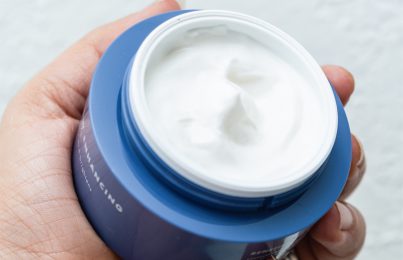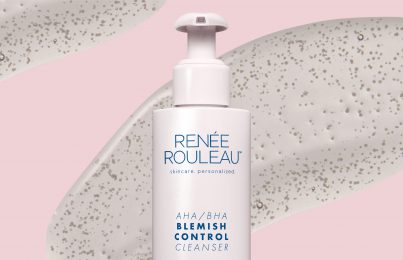Do you struggle with constantly shiny skin? Are you having to reapply your makeup every few hours? Is accidentally leaving your blotting sheets at home a cause for panic? Chances are you have oily skin (Skin Type 1-4), generally characterized by excess oil production and visibly larger pores (most commonly in the T-zone). This type of skin is also more prone to clogged pores and blemishes. While your skin type boils down to a few unchangeable factors, such as genetics and age, a thoughtful skincare routine and the right ingredients can do wonders for managing oily skin and preventing breakouts.
How To Tell If You Have Oily Skin
Yes, all people produce oil, also known as sebum, as it is a way for our bodies to excrete waste out of the skin. This is how your skin protects and moisturizes itself. Sebum is key to preventing moisture loss and maintaining barrier function. Dry skin types naturally produce very little sebum on their own (not to be confused with dehydrated skin, which lacks water).
But what constitutes a true, oily skin type? I’m here to help you understand oily skin and its many facets. While we can’t always identify it by appearance– as some people experience thin, slick, and shiny sebum, and others matte, waxy sebum–there are a few other factors that we can keep in mind.
Pore Size
The size of your pores is generally the first place to start when determining if you have oily skin. The larger the pore, the more oil you will produce. This is because oil and sweat expand the pore walls, causing them to stretch out. The good news? You can minimize the appearance of your pores over time.
Acne
Not all people with oily skin will have acne, however, almost everyone with acne has oily skin. Oil laying on top of the skin breeds bacteria, leading to clogged pores and breakouts. Clogged pores ultimately result from hardened oil and dead skin cells falling into the pore instead of properly shedding.
Age
Sebum production can also change with age, usually decreasing in production as you get older. In general, your skin type is likely to change every seven to nine years. One study found that sebum production increases during teenage years, declining for women during menopause and rapidly decreasing for men a bit later in life. Since sebum provides natural lubrication for the skin, using hydrating serums and the right moisturizer for your skin type is important to your routine as you get older. I’ve always said that so many skin problems are a direct result of not allowing your skincare routine to grow alongside you. While certain products may have been the key to solving relentless hormonal acne in your teens, they likely won’t deliver the same results as your skin matures and develops new problems.
Still unsure if your skin is classified as oily? I encourage you to take the Skin Type Quiz! With just a few simple questions, you can learn more about your skin, as well as receive personalized product recommendations.
Ingredients To Use For Oily Skin
While we can’t change our skin type or minimize our pores (just their appearance), there are still ingredients that can help decrease oil production and minimize breakouts. So, let’s dive into the specific ingredients that you should use to care for your oily skin.
Salicylic Acid
Salicylic acid is one of the golden ingredients for skin, and rightly so. Most people associate it with being an oil-soluble BHA that dives into the pores to sweep out oil and reduce the formation of acne. While this is true (and a great reason to use it as a spot treatment!) salicylic acid is useful in so many other ways.
One of the best parts about salicylic acid is that it can provide nearly instant results. For starters, it is great for softening the outer layer of skin. This ingredient provides conditioning benefits that not only improve how the skin looks but also how it feels. It clears clogged pores and lessens visible bumps and breakouts in products like Pore + Wrinkle Perfecting Serum. Salicylic acid is also an excellent superficial exfoliant. It works to slough dead cells off the outer layers of skin, providing an instantly smoother, brighter complexion.
While many people hold the superstition that all exfoliating acids have to be at a low pH, salicylic acid provides wonderful exfoliating effects at a neutral pH. A great example of this is the AHA/BHA Blemish Control Cleanser which uses salicylic acid as an exfoliating BHA to clean oil from the skin as well as exfoliate and remove dead skin.
There are also a few benefits to salicylic acid that may take a few weeks to notice. For one, this ingredient has noticeable anti-inflammatory effects that are great for those that suffer from acne and signs of inflammation. It will also communicate with the cells and tell them to reduce the amount of sebum they are producing. This not only removes the oil from the pores but also helps decrease the overall amount of oil produced on the skin. Pretty incredible, right?
Niacinamide
Niacinamide is an ingredient that can do far more for your skin than most people know. One study published in the Journal of Cosmetic Laser Therapy found that daily application of two percent niacinamide significantly reduced the rate at which the body produced sebum as well as reduced overall sebum levels in only 4-6 weeks. Niacinamide’s sebum-reducing properties are also great for those that struggle with the occasional oil-induced breakouts.
Sodium PCA
Sodium PCA is another great ingredient because this one is actually an inherent part of sebum that is produced within the skin, meaning it’s a natural component already. PCA is a great material on its own, but when combined with sodium, it makes for an even better delivery system into the skin. It also serves as a humectant, which will help draw moisture up into the skin without the use of other lipids.
Witch Hazel
While witch hazel has built itself an unpleasant reputation for being drying and irritating, this misunderstood ingredient is actually a great option for those with oily skin. If it still stings to think about (those ‘90s toners were no joke), I think it’s important to note that products no longer formulate with harsh concentrations of 100% witch hazel. New formulations combine a small amount of witch hazel with hydrating ingredients, allowing you to reap the ingredient’s oil-cutting benefits without drying out your skin. Witch hazel’s astringency effect is great for tightening pores, healing the skin, and reducing inflammation, making it a hero product for those with excess oil.
While toners like Balancing Skin Tonic are the most classic method for delivering witch hazel, masks like Energizing Clay Masque and moisturizers like Daily Mattifying Solution are great alternatives with the same astringent benefits!
Panthenol
Lastly, Panthenol is an amazing ingredient when it comes to reducing inflammation. It is also non-comedogenic, making it a great choice for those struggling with acne. It’s great for improving skin conditions and reducing any scarring associated with acne.
Ingredients To Avoid For Oily Skin
Now that you know oily skin’s ingredient heroes, it’s time to discuss the equally important matter of which ingredients to avoid when caring for oily skin. Here are a few ingredients that I recommend keeping out of your routine…
Drying Alcohols
You may be thinking that the goal when dealing with oily skin is to dry it out, but this is not the case. Products containing drying alcohols are only going to strip your skin entirely of sebum, causing it to go into panic mode and produce even more. After all, sebum provides that natural lubrication that keeps your skin healthy. We don’t want to eliminate it, we just want to keep it at manageable levels.
Strong Cleansers
Many foaming or gel cleansers are still formulated with ingredients like Sodium Lauryl Sulfate, Sodium Laureth Sulfate, or Ammonium Laureth Sulfate. While these ingredients are surfactants, meaning they are cleansing agents that cut oil from the skin, they are not in alignment with your skin’s natural pH. These ingredients will strip too much water out of your skin with every wash, leaving you with damaged, dehydrated skin.
Mineral Oil and Petrolatum
Oily and acne-prone skin types should steer clear of mineral oil and petrolatum due to their comedogenic properties. These ingredients are very occlusive and are likely to trap dead skin cells and sweat into your skin, leading to clogged pores.
Isopropyl palmitate and Isopropyl Myristate
These are esters that are commonly used as a thickening agent in moisturizers and hair care. While they are not necessarily a no-no for oily skin, those with acne should try to avoid them due to their comedogenic properties. They may feel lighter than traditional oils, however, they are known to cause clogged pores and contribute to breakouts with repeated use.
The most important thing to keep an eye out for when researching products is to pay attention to where your information is coming from. A lot of skincare do’s and don’ts can be demonstrated with science, but a lot of it just comes down to experience. It’s critical to look at who you’re receiving information from and what qualifications they have. At the end of the day, you can spend a lot of money on products falsely advertised for oily skin and still end up disappointed when you’re not getting the results you wanted.
Next, learn how to spot-treat a pimple at every stage.
Celebrity Esthetician & Skincare Expert
As an esthetician trained in cosmetic chemistry, Renée Rouleau has spent 30 years researching skin, educating her audience, and building an award-winning line of products. Her hands-on experience as an esthetician and trusted skin care expert has created a real-world solution — products that are formulated for nine different types of skin so your face will get exactly what it needs to look and feel its best. Trusted by celebrities, editors, bloggers, and skincare obsessives around the globe, her vast real-world knowledge and constant research are why Marie Claire calls her “the most passionate skin practitioner we know.”




Comments:
Thank you for sharing insights on how those ingredients can help or ruin our skin. Knowing this guideline is beneficial for having smooth, healthy skin.
Posted By: AMVital |
Hello, Renée, I have been following you and reading your blogs for years. I love your voice of reason when it comes to skincare.
One ingredient I believe should be added to your list to avoid for oily skin types is coconut oil. It seems to be in so many products these days and I avoid it like the plague. Lol Thank you for all your amazing education. I have learned so much from you.
Posted By: Angelcat47 |